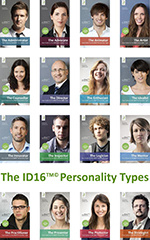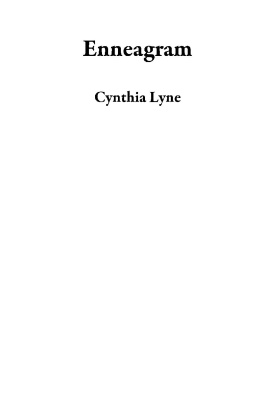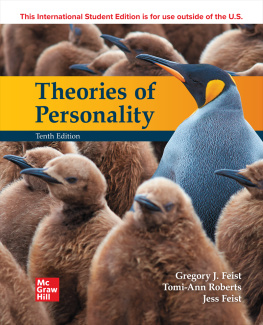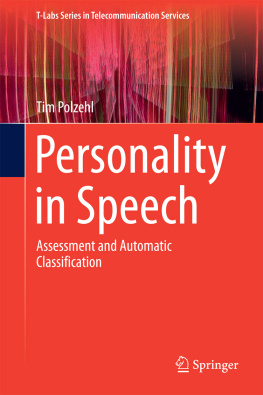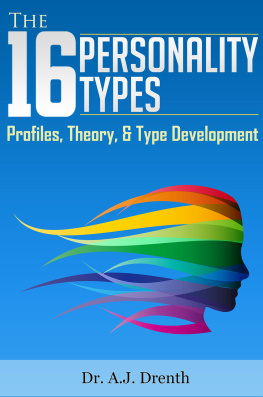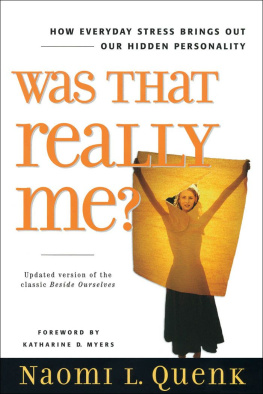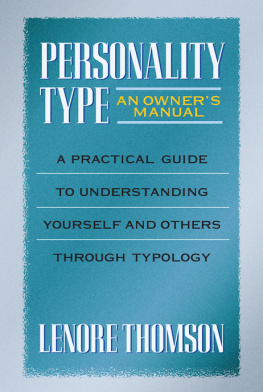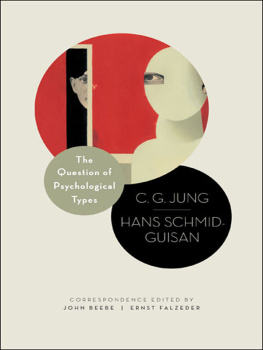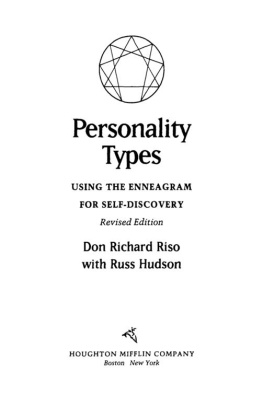ME,
MYSELF,
AND US

Copyright 2014 by TRAQ Consulting Inc.
Published in the United States by PublicAffairs, a Member of the Perseus Books Group
All rights reserved.
No part of this book may be reproduced in any manner whatsoever without written permission except in the case of brief quotations embodied in critical articles and reviews. For information, address PublicAffairs, 250 West 57th Street, 15th Floor, New York, NY 10107.
PublicAffairs books are available at special discounts for bulk purchases in the U.S. by corporations, institutions, and other organizations. For more information, please contact the Special Markets Department at the Perseus Books Group, 2300 Chestnut Street, Suite 200, Philadelphia, PA 19103, call (800) 810-4145, ext. 5000, or e-mail .
Book Design by Linda Mark
Text set in 11pt ITC Esprit Std by the Perseus Books Group
Library of Congress Cataloging-in-Publication Data
Little, Brian R.
Me, myself, and us : the science of personality and the art of well-being / Brian R Little.
pages cm
Includes bibliographical references and index.
ISBN 978-1-58648-968-7 (e-book) 1. Personality. 2. Well-being. I. Title.
BF698.L545 2014
155.2--dc23
2014020499
First Edition
10 9 8 7 6 5 4 3 2 1
For my wife, Susan, with love
Contents
M E, MYSELF, AND US EXPLORES QUESTIONS THAT ARE rooted in the origins of human consciousness but are as commonplace as the conversation you had at breakfast this morning. The questions are very personal and deal with you, yourself. Am I really an introvert? Why can I motivate my employees but cant connect at all with my kids? Why am I a completely different person at home from the person I am at work? Do I really control the things that matter to me? I seem to be uncommonly happyis there something wrong with me? Is there any truth to the ludicrous rumor that I am, in essence, a jerk?
Some of these questions deal with us, the other people in your life, particularly those who matter to you. Why does my ex-spouse do those things he does? Can I trust the new associates in my firm? Why was my grandmother so much happier than my mom? Should I be concerned that my daughter invests more in her online friends than in her immediate family?
To answer these kinds of questions we will draw on recent advances in the field of personality psychology and explore several key ways of understanding personality. We will start by examining your personal constructs, the cognitive goggles you use to understand yourself and others. We will then examine your traits, your goals and commitments, and the personal contexts of your everyday life. We will show how each of these factors helps shape the course of our lives and how understanding them helps us reflect on where our lives have gone and where they might still go.
Personality psychology emerged as an academic specialty in the 1930s, but its roots extend back to philosophical and medical theories in fourth-century BCE Greece. Influential among these ancient theories were those that emphasized how various bodily humorsair, black bile, blood, and yellow bilegave rise to four corresponding temperamental types: phlegmatic, melancholic, sanguine, and choleric personalities. Although such views are now thoroughly discredited, for centuries they were the dominant way of thinking about personality. So if your breakfast conversation had taken place during medieval times, the rumor that you were a jerk, ludicrous or not, would likely have been attributed to your surplus of yellow bilethat was your basic nature, and there was little you could do about it. There are echoes today of such a view about personality in theories that emphasize types of individuals. You may have already typed yourself because of a test you have taken: you think you are an extravert or a Type A, and youre curious about whether such ways of thinking about yourself have any scientific validity. We will deal in some detail with such issues in the chapters that follow, and the answers might surprise you.
Those of you who have taken courses in psychology will be familiar with theories of personality that emphasize unconscious drives and impulses as the root causes of our behavior. The theories of Sigmund Freud and Carl Jung, which were particularly influential in the early twentieth century, still have an influence in clinical psychology and literary fields but have fallen out of favor among academic researchers in personality psychology. If you have come to believe that the most consequential aspects of your personality are unconscious forces, primarily sexual in nature, what follows will certainly challenge you. Although forces of which we are unaware may well drive our behavior, such influences will not be the prime focus of this book; rather, we will explore how your life is more actively shaped by your goals, aspirations, and personal projectsself-defining ventures that provide meaning in your life. Looking at personality in this way provides you with a vantage point from which to reflect upon your life and think about your future. You are not simply a passive pawn manipulated entirely by forces beyond your control, even though you may have your doubts when you wake up and reflect on what an idiot you were last night.
Another way in which you may have come to think about your personality was through the humanistic psychology of Carl Rogers, Abraham Maslow, and others that flourished in the mid-twentieth century. In contrast with theories that emphasized unconscious determinants of personality, the humanistic psychologists emphasized the more active and growth-oriented aspects of human behavior. A generation that believed deeply in the human capacity, both individually and collectively, to shape our own futures enthusiastically endorsed this human potential perspective. Unfortunately, rigorous science did not match much of the rhetoric of the humanistic movement in psychology. Indeed, scientific objectivity was, itself, seen as a barrier to a true understanding of human nature, a view that was particularly prominent in new age approaches to understanding ourselves.
Today this more optimistic view of our capacity for meaningful lives is studied by the field of positive psychology, which explores factors that enhance flourishing in individual lives, communities, organizations, and nations.will involve the art of well-beingthe creation of a distinctive, singular way of reflecting on your life.
I dont assume in this book that you have prior knowledge about personality psychology or of psychology, for that matter. I only assume that you are curious about understanding how personality can shape our lives. But some of you might well have taken a course in psychology and are aware that personality psychology went through a crisis in the 1970s as a result of the publication, in 1968, of a book by Walter Mischel, then at Stanford University. Mischels book, Personality and Assessment, challenged the whole notion of stable traits of personality. He concluded that there was scant evidence for broad, stable traits of personality, concluding that much of our daily conduct was based instead on the situations we confronted and the ways we construed those situations. Some took this as an indictment of the whole field of personality psychology, and a generation of psychology students was then taught that they should look elsewhere to understand the origins of their behavior. Perhaps you were taught this and thus approach the field of personality psychology with caution.
Next page

